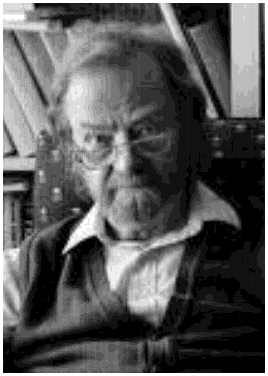The Boxes
A Memoir of a
Life in Poetry
Donald Hall
(Houghton Mifflin)

His images of the small-town northeast from the 40s and 50s are impeccable: bottles of milk on the doorsteps in the early morning (his father was treasurer at a local diary), school teachers branded as "old maids," kids biking all over town without adult supervision, and the peaceful picture of his mother and father reading "every night, sitting in soft chairs, silently gazing into books and magazines."
- Every Sunday night my mother made a big platter of sandwiches which we ate in front of the Philco while we listened to Jack Benny. An hour later, Fred Allen came on.
The middle of Boxes turns a bit fey, as we are introduced to dozens of poets and writers that Hall knew or met which, if we didn't know better ... and we don't ... might be a case of overkill (if not friendly fire). After hanging out as a young student with Robert Frost, Richard Eberhart, Richard Wilbur, John Ciardi, Robert Bly, John Ashbery and Frank O'Hara, what do you do for an encore?
Hall is now in his eighth decade. And, of the outrages that they visit on the very old, there is nothing he hasn't experienced: diabetes, strokes, cancer, urinary problems, lack of energy, loneliness, depression. Once he fell, lay there because the telephone was blocked, couldn't get up, was only found the next day.
With the loss of his wife Jane, he turned bipolar, "black, dour, hopeless" ... as she had been. His mourning was obviously profound, but public --- possibly overly so. Many months after her death, people continued to leave "tributes" at her graveside. Death does seem to have a special dominion for him.
His night time off-duty adventures are certainly more colorful than his official ones. Not long ago, he was arrested at ten-thirty P. M. on a two-lane highway near his home in New Hampshire. He was a suspected DUI. An unsmiling police officer demanding that he "walk the line" (even though, after his stroke, his balance "was poorer than ever.") Picture the aged Poet Laureate being shoved against his car, searched for weapons, handcuffed, "stuffed into the back seat of a police cruiser on Route 104 in New Hampton, New Hampshire." He certainly didn't help his case by telling the officer that Despite this diverting episode, the most of Unpacking the Boxes brings to mind a line from Hall's own son Andrew, when he was but a lad, when his poet father took him to a University of Michigan football game. "After a pause, and with perfect benignity, he added, 'I'd rather you didn't, but I don't mind.'" In recent years, Hall has been showered with plaudits. Two years ago he was named Poet Laureate of the United States, and spends a couple of pages telling us about the many interviews and news stories that came his way as a result. I am not so sure he needs to gild this particular lily, for he is smart enough to know that the plum term "Poet Laureate" is handed out easily to the old, the toothless, the venerable ... if not vulnerable. The Washington ceremonies he dutifully attended along with Laura Bush would have been a bit livelier if he had gotten up the pluck to stand and to denounce certain foreign entanglements cooked up by her husband. However, contrary to a New York Times editorial, he claims his only political passion is the First Amendment to the Constitution.
In recent years, Hall has been showered with plaudits. Two years ago he was named Poet Laureate of the United States, and spends a couple of pages telling us about the many interviews and news stories that came his way as a result. I am not so sure he needs to gild this particular lily, for he is smart enough to know that the plum term "Poet Laureate" is handed out easily to the old, the toothless, the venerable ... if not vulnerable. The Washington ceremonies he dutifully attended along with Laura Bush would have been a bit livelier if he had gotten up the pluck to stand and to denounce certain foreign entanglements cooked up by her husband. However, contrary to a New York Times editorial, he claims his only political passion is the First Amendment to the Constitution.he arrested me for the crime of DWO, driving while old, derived from the well known crime of DWB, driving while black.
I was studious to explain what was happening on every play. After a disquisition on the single-wing, I asked him, "Do you mind me telling you all this?" "Oh, no," he said. "I don't mind."